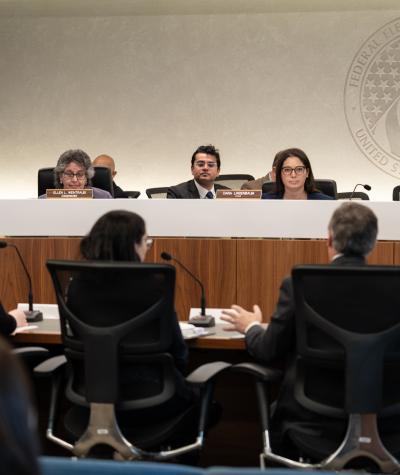It’s apparent that there’s a real crisis of faith in our democracy.
Our elected officials are not as responsive to the will of the people as they should be, largely due to wealthy special interests spending big money to influence our vote and our government to rig the system in their favor.
This crisis grows worse when the Federal Election Commission (FEC), the independent agency charged with enforcing our campaign finance laws, evades its enforcement responsibilities and refuses to hold bad actors accountable.
Campaign Legal Center Action (CLCA), on behalf of End Citizens United (ECU), has sued the FEC for wrongfully dismissing ECU’s complaint against Florida Senator Rick Scott and New Republican PAC for breaking campaign finance law.
Despite strong evidence suggesting that the super PAC illegally coordinated with Scott’s Senate campaign, the FEC refused to even investigate ECU’s allegations.
CLCA has sued to ensure that when the FEC fails to fulfill its responsibility to properly apply and enforce campaign finance laws, the FEC is accountable and subject to judicial review and correction.
The Federal Election Campaign Act (FECA) was designed to increase transparency and limit the risk of corruption so that voters can make informed decisions and elected officials can actually represent the will of the voters who elected them rather than do the bidding of special interests.
FECA does so, in part, by restricting the sources and amounts of contributions to federal candidates and requiring candidates to file periodic financial disclosure reports that inform the electorate of who is spending money to influence their votes.
At every turn, however, politicians and those interested in influencing them have exploited loopholes to evade FECA’s fundraising limitations and disclosure requirements.
Before FECA was amended by the Bipartisan Campaign Reform Act (BCRA, also known as the McCain-Feingold Act), candidates would avoid the restrictions of federal campaign finance law by using money raised by entities subject only to state laws — which are often far more lax than federal law.
After BCRA expressly prohibited that workaround, candidates and campaigns have found new ways to avoid the act’s disclosure requirements and contribution limitations.
For instance, candidates and their campaigns and committees have invented backdoor ways to get super PACs — which are entities that are allowed to raise and spend unlimited amounts of money so long as they do so independently — to spend money in specific ways that help them get elected.
Another way candidates and campaigns try to avoid these limitations is to pretend like they have not yet decided to become a candidate while helping entities raise massive amounts of money that the entity then uses to support the candidate once they’ve declared their intent to run for office.
Though creative, these workarounds are unlawful. FECA specifically prohibits federal candidates from raising or spending funds that are not subject to federal campaign finance laws, or so-called “soft money,” including funds raised or spent by an entity that the candidate “established, financed, maintained, or controlled.”
FECA also prohibits candidates from deliberately delaying announcing their candidacy despite having decided to run for office and soliciting, on a super PAC’s behalf, corporate funds or individual contributions of over $5,000 per year.
The Federal Election Commission (FEC) is tasked with enforcing these laws and curbing efforts to violate them. Unfortunately, the FEC has too often refused to act in the face of blatant violations.
In recent years, the FEC has attempted to shield its refusal to enforce the law from judicial review by labeling agency dismissal decisions as an exercise of “prosecutorial discretion,” and claiming that such discretionary decisions cannot even be reviewed by the courts.
This tactic undercuts campaign finance law and undermines democracy in the process.
This is exactly what has happened in a case that Campaign Legal Center Action is litigating on behalf of End Citizens United (ECU) regarding an FEC complaint ECU filed in April 2018 against then-Governor of Florida Rick Scott, and his nascent Senate campaign.
Scott illegally delayed declaring his candidacy with the FEC to avoid triggering federal requirements, while co-opting New Republican — a super PAC — to raise millions of dollars outside the legal limitations, which would later be spent supporting his campaign.
The FEC invoked “prosecutorial discretion” when it dismissed ECU’s complaint against Scott.
In January 2024, a panel of judges on the U.S. Court of Appeals for the D.C. Circuit concluded that the FEC’s dismissal based on prosecutorial discretion was unreviewable, relying on a pair of decisions from that court that the FEC has been relying on to shield its dismissal decisions from judicial review.
Last fall, the court of appeals issued a rare decision agreeing to reconsider the panel’s decision in this case, including the court’s own earlier decisions concluding that the FEC’s supposed exercises of prosecutorial discretion are unreviewable.
CLCA argued the case in February 2025 before the full Court, urging the court to correct the faulty legal reasoning in prior judicial decisions that the FEC has been using to evade accountability for its refusal to enforce campaign finance law.
Going forward, CLCA argued, the FEC should not be able to use “prosecutorial discretion” as a tool to shield its decisions from review by courts. The Commission should not be able to bypass important checks and balances that make sure our campaign finance laws get properly enforced.
Whatever the outcome of this case, it is clear that in order to reduce political corruption and ensure elected officials are responsive to the voters, we need real transparency about who is spending big money on elections.

